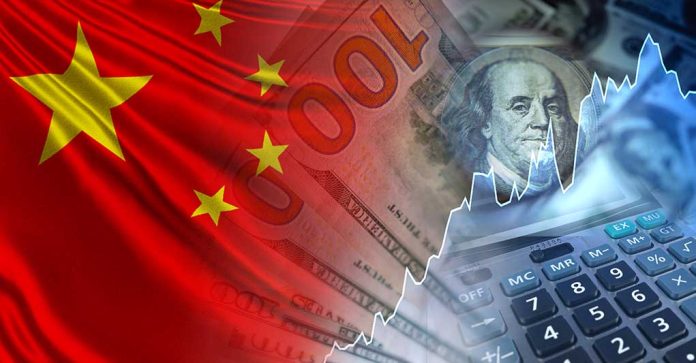🔴 Website 👉 https://u-s-news.com/
Telegram 👉 https://t.me/usnewscom_channel
China’s chokehold on America’s medicine cabinet and rare earth minerals has national security experts sounding the alarm as our dependence on a hostile foreign power for life-saving drugs reaches critical levels.
At a Glance
- Over 80% of active ingredients in American medications are manufactured in China, leaving the U.S. vulnerable to supply disruptions
- The last U.S. penicillin manufacturing plant closed in 2004, highlighting complete dependence on foreign production for essential antibiotics
- China has already restricted exports of rare-earth minerals crucial for defense technologies, with medicines potentially next
- National security officials warn China could “weaponize” medicine supply chains during geopolitical conflicts
- President Trump’s administration has pushed to revitalize domestic production using the Defense Production Act
America’s Critical Medical Vulnerability
The United States faces an unprecedented national security threat that few Americans realize exists. Over the past 25 years, our pharmaceutical manufacturing base has steadily migrated overseas, primarily to China, creating a dangerous dependence on a strategic competitor for life-saving medications. According to defense and healthcare experts, this shift places America in a precarious position where a foreign adversary now controls the supply of essential medicines required by our military, healthcare system, and general population.
The scope of this dependence is staggering. China manufactures 97% of antibiotics used in the United States and controls the production of thousands of active pharmaceutical ingredients (APIs) found in generic medications that comprise 90% of prescriptions filled by Americans. This outsourcing occurred gradually as pharmaceutical companies sought cheaper manufacturing options, leaving the U.S. with virtually no domestic capacity to produce many critical medicines.
The Strategic Implications
National security officials have increasingly voiced concerns that China could leverage this dependency during geopolitical conflicts. “If the enemy releases anthrax and they control the antidote, it would cause complete disruption to American society and to our national security,” warned Brigadier General John Adams, USA (Ret). This isn’t merely theoretical – China has already demonstrated willingness to restrict exports of critical materials, having suspended exports of rare-earth minerals essential for manufacturing defense technologies.
“If China shut the door on exports of medicines and their key ingredients and raw material, U.S. hospitals and military hospitals and clinics would cease to function within months, if not days,” said Rosemary Gibson, author of “China Rx” and a senior advisor at the Hastings Center bioethics research institute.
The vulnerability extends beyond routine medications to critical supplies needed during crises. During Covid-19, America’s dependence on China for personal protective equipment, testing supplies, and pharmaceutical ingredients exposed dangerous gaps in our medical supply chain. China’s state-run media outlet Xinhua even threatened that the U.S. would “fall into the hell of a new coronavirus pneumonia epidemic” if China withheld medical exports, demonstrating how this dependency can be weaponized.
Quality and Safety Concerns
Beyond supply vulnerabilities, the FDA has documented serious quality control issues at Chinese pharmaceutical manufacturing facilities. These problems have led to recalls of blood pressure medications, cancer treatments, and other critical drugs due to contamination with carcinogens and other dangerous impurities. The 2008 heparin crisis, where contaminated Chinese-made blood thinners caused 81 American deaths, serves as a stark reminder of the risks associated with offshore drug production with inadequate oversight.
“If you’re the Chinese and you really want to destroy us, just stop sending us antibiotics,” former National Economic Council Director Gary Cohn warned during a White House meeting.
The FDA’s inspection capabilities abroad have been stretched thin, with the agency struggling to adequately monitor the thousands of foreign facilities producing medications for the American market. While inspectors are stationed overseas, critics argue the regulatory regime remains insufficient to protect Americans from potentially dangerous products manufactured with lower standards than those required domestically.
Solutions and Policy Responses
President Trump has recognized this vulnerability and taken steps to address it through multiple executive actions. His administration invoked the Defense Production Act to boost domestic production of critical medical supplies and has supported initiatives to reshore pharmaceutical manufacturing. The focus is shifting from merely lowering drug costs to ensuring Americans have access to medications regardless of global disruptions or foreign interference.
Senator Tom Cotton introduced legislation to boost domestic drug production and limit Chinese pharmaceutical imports by 2030. The bill would provide financial incentives for American companies to manufacture APIs domestically while imposing tariffs on Chinese medications to level the playing field. This approach recognizes that while initial production costs may be higher, the national security benefits of a domestic supply chain far outweigh short-term price considerations.
Experts recommend refurbishing empty manufacturing facilities with public support and funding to jumpstart domestic production. The Strategic Active Pharmaceutical Ingredients Reserve, intended to stockpile critical medicine components, remains underfilled, highlighting the urgent need for congressional action to secure America’s medical supply chain. Without decisive intervention, our dependence on China for life-saving medications will continue to pose an unacceptable national security risk.
